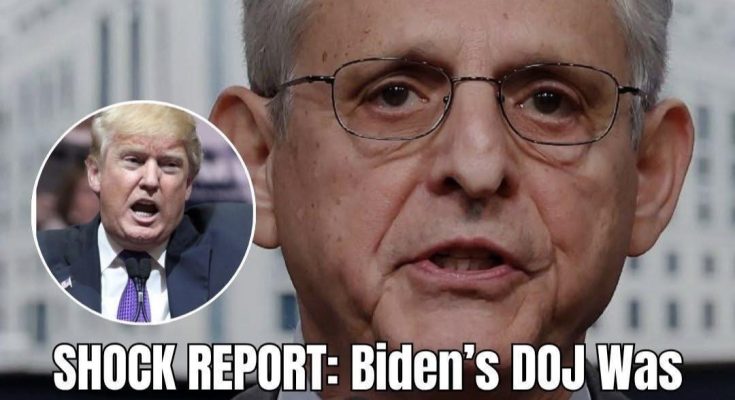The U.S. Department of Justice is once again facing criticism after newly released documents suggest that federal investigators may have targeted the communications of several Republican lawmakers and officials as part of an ongoing probe known internally as “Arctic Frost.”
The revelations, brought to light by Republican members of the House Oversight Committee, have reignited a broader debate about political bias and the use of investigative power within the federal government.
According to a series of findings and internal records reviewed by the committee, the DOJ and FBI reportedly issued subpoenas for the phone records of multiple current and former Republican officials — including sitting members of Congress — as part of the Arctic Frost inquiry. The scope of the investigation, and the rationale for these subpoenas, remain unclear.
What the Documents Show
In a post shared on the social media platform X (formerly Twitter), the Oversight Committee outlined several key details it says are drawn from the Arctic Frost materials:
- FBI field offices across the country were enlisted to conduct interviews and gather intelligence related to the investigation.
- Investigators requested approximately $16,600 in travel funds to conduct more than 40 in-person interviews.
- At least 45 individuals — including political figures such as Steve Bannon, Rudy Giuliani, Mark Meadows, Jeffrey Clark, John Eastman, and Rep. Scott Perry — were listed as potentially being under federal scrutiny.
- Another 111 individuals, including former Trump officials Peter Navarro, Dan Scavino, Jeff Rosen, and Ed Martin, were also cited as possible subjects of interest.
Perhaps most notably, the Oversight Committee claimed that at least nine sitting U.S. senators — among them Ted Cruz (R-TX), Marsha Blackburn (R-TN), Ron Johnson (R-WI), Bill Hagerty (R-TN), Josh Hawley (R-MO), Lindsey Graham (R-SC), Cynthia Lummis (R-WY), Dan Sullivan (R-AK), and Tommy Tuberville (R-AL) — had their phone or data records subpoenaed during the course of the investigation.
If confirmed, such subpoenas would mark one of the most sweeping DOJ efforts involving elected officials in recent history.
A Cloud of Secrecy
While the Arctic Frost probe has been referenced in scattered reports over the past year, little has been publicly confirmed about its precise scope or objectives.
Republican lawmakers argue that the new evidence shows a pattern of politically motivated targeting under the Biden administration. They claim the investigation mirrors earlier controversies surrounding the Justice Department’s handling of politically sensitive cases — including the Hunter Biden inquiry and the treatment of parents protesting school board policies.
Democrats, meanwhile, have urged caution, saying that much of the information released so far lacks context and that internal investigations of politically connected figures must be handled delicately to preserve both integrity and transparency.
A spokesperson for the DOJ declined to comment directly on the committee’s allegations, citing an ongoing investigation, but emphasized that “all actions taken by the Department are guided by law and established policy.”
Senator Grassley Responds
Longtime Iowa Senator Chuck Grassley (R-IA) — known for his oversight of federal agencies — issued one of the strongest reactions to the revelations, calling the situation “deeply troubling” and urging the DOJ to provide clarity about the purpose and authorization behind the subpoenas.
“The Department of Justice cannot continue to operate under a veil of secrecy when the American people’s trust is already so badly eroded,” Grassley said in a statement. “We need transparency, not selective silence.”
Grassley, who has spent years investigating the politicization of federal agencies, added that Congress has a duty to ensure the DOJ remains accountable to the public and not weaponized for partisan objectives.
A Broader Debate Over Trust and Power
The Arctic Frost controversy comes amid a broader reckoning about the power of federal law enforcement agencies and their role in politically charged investigations.
Critics argue that in recent years — under both Democratic and Republican administrations — the Department of Justice and the FBI have too often been drawn into political disputes. Each new revelation, they say, deepens public skepticism about whether these institutions operate impartially.
“Every time we see a leak or a report suggesting surveillance of political figures, it chips away at faith in the system,” said Dr. Allison Greene, a political scientist at George Mason University. “The problem isn’t just the investigation itself — it’s the perception that justice may be applied differently depending on one’s political party.”
Public opinion polls reflect this growing distrust. A 2025 Gallup survey found that only 37% of Americans expressed confidence in the FBI — down from over 50% a decade earlier. Confidence in the DOJ has followed a similar trajectory.
Was the President Involved?
One of the more contentious questions surrounding Arctic Frost is whether President Joe Biden or senior White House officials played any role in initiating or approving the investigation.
So far, no evidence has emerged directly linking the President to the operation. However, Republican lawmakers remain skeptical, noting that the subpoenas targeted some of Biden’s most outspoken political opponents.
White House officials have consistently denied any involvement, stating that the President has maintained the DOJ’s independence in all law enforcement matters.
Still, critics argue that the administration bears responsibility for ensuring that federal agencies are not misused — even indirectly.
“Whether or not the President ordered it, this happened on his watch,” said Rep. James Comer (R-KY), chairman of the House Oversight Committee. “And the American people deserve to know why.”
The Special Counsel’s Role
At the center of the controversy is Special Counsel Jack Smith, who has overseen several high-profile investigations since his appointment in 2022.
Republicans have accused Smith of operating with a partisan bias, pointing to his aggressive prosecution of former Trump officials. Democrats, on the other hand, view him as an independent figure tasked with applying the law without fear or favor.
According to sources familiar with the Arctic Frost materials, Smith’s office coordinated with FBI field agents across multiple states to collect data and conduct interviews. Critics say this decentralized approach made oversight difficult and may have led to inconsistent standards for evidence gathering.
“This investigation appears to have grown far beyond its original mandate,” said a former DOJ official who requested anonymity. “The scale of it raises real questions about oversight and accountability.”
A Call for Reform
The new disclosures have renewed calls for reforming the Department of Justice to limit political interference and improve transparency in sensitive cases.
Lawmakers from both parties have floated proposals ranging from enhanced congressional oversight to stricter judicial review of subpoenas targeting elected officials.
Some have also suggested establishing a permanent independent inspector general specifically focused on political investigations — a measure intended to separate legitimate law enforcement actions from politically motivated probes.
“We need a structure that restores public confidence,” said Sen. Marsha Blackburn (R-TN), one of the senators reportedly subpoenaed. “No American — elected or not — should ever have to worry about being targeted for their political beliefs.”
What Comes Next
The Oversight Committee has requested additional documents from the Justice Department and plans to hold hearings later this year to question key officials involved in Arctic Frost.
Legal experts predict that the process could take months, if not years, and that many of the subpoena details will remain classified due to national security considerations.
In the meantime, the revelations are likely to further intensify partisan tensions heading into the 2026 midterm elections — with Republicans seizing on the issue as evidence of government overreach, and Democrats warning against premature conclusions.
As the investigation unfolds, one thing is certain: the debate over the boundaries of federal power — and whether justice can truly remain blind to politics — is far from over.

